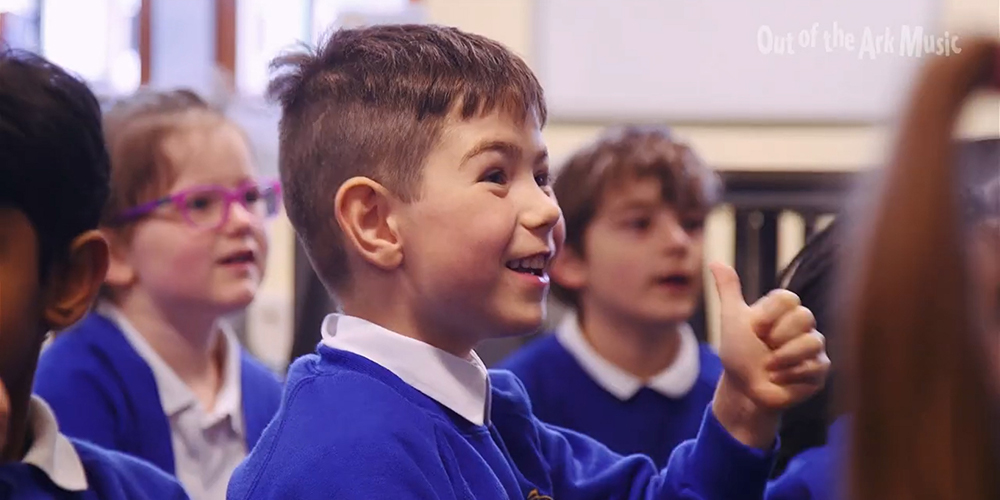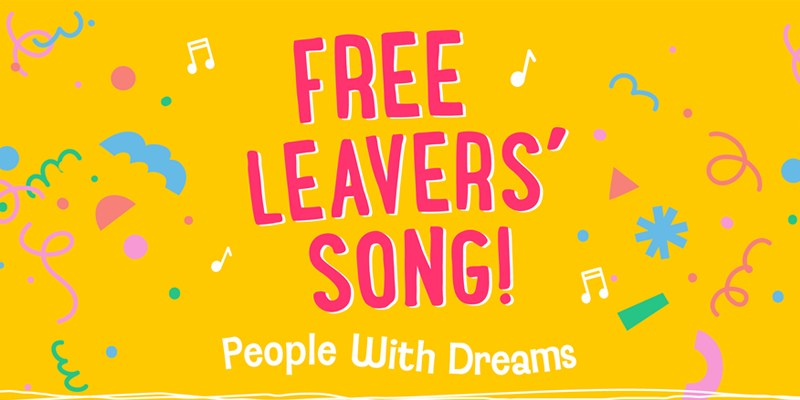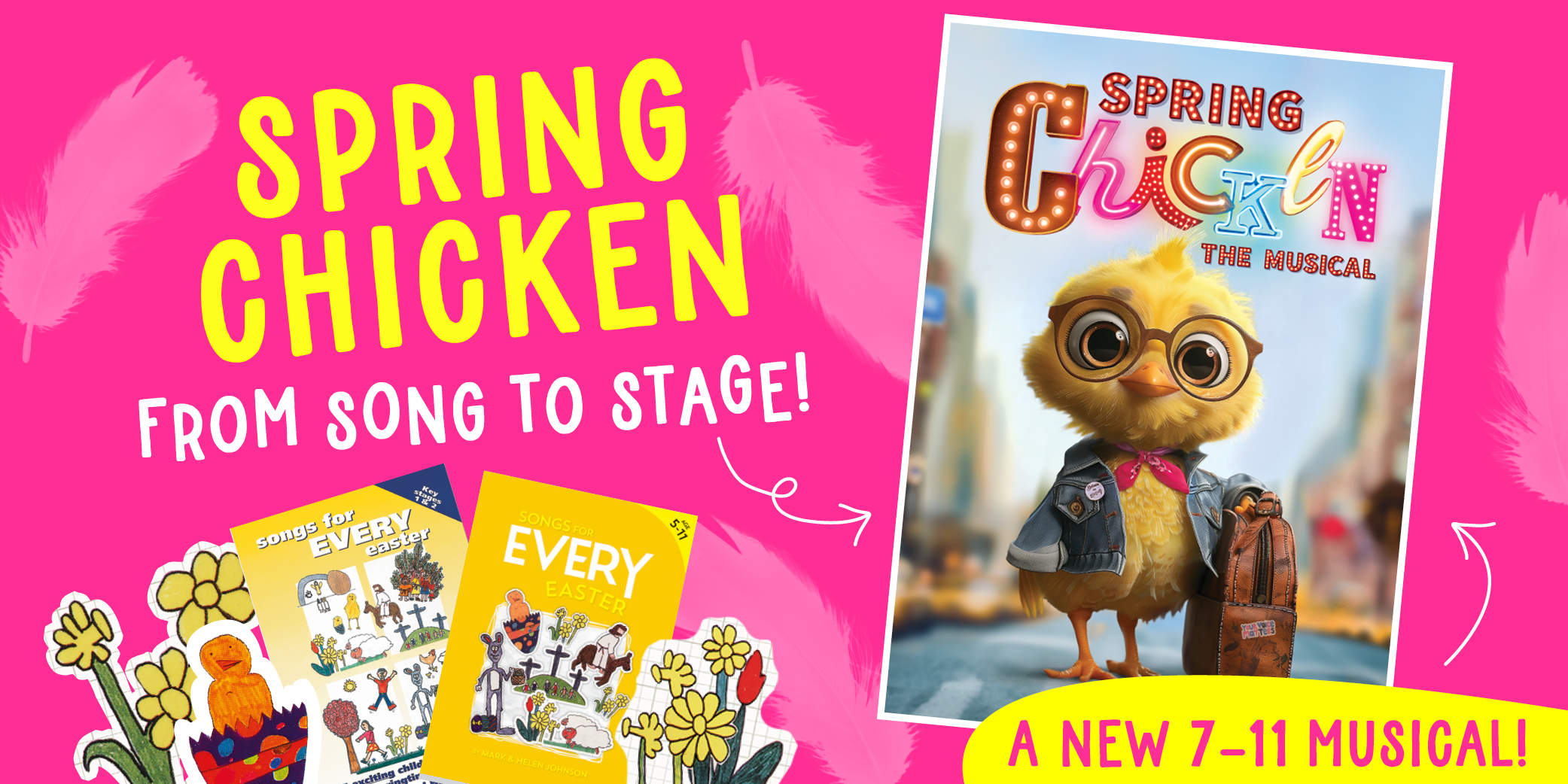
Singing is a foundational musical skill and one of the most natural ways for children to engage in making music and central to the development of musicianship (Demorest et al 2017).
It can make children’s brains light up like a Christmas tree and it’s something they should be doing every day of the week because it’s good for their development on so many levels.
Research has shown that music-making improves a myriad of cognitive and non-cognitive skills and the variety of skills needed for singing help develop the whole child.
Here are some of the ways singing can help with child development:
1. Singing increases sensory development
Taste, textures and colours all aid a child’s sensory development and so does music. When children are given opportunities to sing and listen to an eclectic diet of songs then this creates more pathways between the cells in their brains. This effect increases even more when we are able to link music to different subjects and activities such as dancing and languages.
2. Singing supports creative expression
Singing encourages children to express themselves emotionally and creatively and so be whoever they want to be. If they want to be a rock star or an opera diva then they can be. It is an artistic and fun way to boost enjoyment, achievement and develop identity and individuality. Singing is freedom and there are no limits, and animates mind, body and spirit.
3. Singing improves speech
Music development flows into language development and singing can help children distinguish sounds and understand language patterns. Hearing songs requires children to listen for the individual notes combined with their rhythmic values and pitch changes so it teaches them auditory discrimination, phonological awareness (alliteration, rhyme, rhythm, etc), vocabulary development and improves their auditory memory.
Singing helps children imitate and consolidate articulation skills because singing involves a clear articulation of sounds and words. They learn to pronounce sounds and words and manipulate them for effect. It is especially efficient in treating stuttering and developing diction.
4. Singing improves language skills
Singing stimulates and improves language development. It can help children develop bigger vocabularies, a better sense of grammar and become more verbally adept. Music-making and singing can help benefit both the development of the mother tongue and the learning of other languages (Henriksson-Macaulay, 2014).
5. Singing teaches opposites
Singing teaches opposites such as loud and soft, fast and slow, high and low, legato and staccato, happy and sad. Learning these musical dynamics helps children differentiate between opposite tasks.
6. Singing improves memory
The repeated use of the ‘memory muscle’ is one of the biggest benefits of singing. When children learn words attached to a tune then this becomes embedded which is why singing the alphabet works wonders. Remembering lyrics and learning timing teaches the brain to handle lots of tasks and get better at them so learning songs can improve mental agility and reading skills.
7. Singing teaches critical thinking and listening
Singing songs gives children opportunities to interpret the lyrics and explore different meanings, intentions, ideas, beliefs and practices. When they interact with different songs they can learn to discuss, argue and explain choices and experiences.
Children learn how to listen to things and how to think about things while they listen and their reactions can be fascinating.
8. Singing improves academic performance
Music is multi-sensory and reaches parts of the brain that other subjects have trouble finding. Yet music is so cross-curricular that it helps unite and develop skills far and wide, especially in maths. Singing in other lessons helps makes learning ‘sticky’ and a song that children know well can provide a mnemonic structure to support learning (Brown et al, 2014) and poems and songs lay a foundation for common knowledge.
9. Singing builds self-esteem
Singing really gets the endorphins flowing in the brain and children will discover that music has the ability to make them feel good and so they can use music as a source of comfort and inspiration for building their self-confidence. Learning a new song gives a real sense of accomplishment and through singing, all children can feel successful. Children who sing are happy children.
10. Singing builds collaboration
Singing brings children together and builds a sense of community which is essential for their social and psychological development. They learn to respect differences and being together as part of a choir can give children a feeling of belonging and can help them make friends. They learn cooperation, sharing and compromise. Singing is a powerful way to foster connectedness essential for cultivating belonging, safety and security (Myers, 2019).
11. Singing oxygenates the brain
Singing is an aerobic activity (Marsh, 2015) that boosts oxygenation in the bloodstream, increasing mental alertness. Singing, therefore, encourages deep breathing and gets more oxygen to the brain. Singing gives us that feel-good and refreshed ‘alive’ sensation.
12. Develops breathing
Singing clears sinuses and respiratory tubes and singing can lead to a stronger diaphragm and stimulation of circulation due to the greater amount of oxygen needed to carry a tune. It can improve the self-management of breathlessness, lung health and especially help children with compromised lungs.
Singing helps children breathe more deeply than many forms of strenuous exercise, improves their aerobic capacity and helps release muscle tension.
13. Singing improves posture
Singing is a full-body activity and can help children develop their poise and a superior posture. It teaches them that their body is the engine that drives their voice and so having a good posture and being aware of their body parts enhances their breathing and results in a better-sounding voice.
14. Singing improves behaviour and concentration
Singing teaches children self-discipline, patience, resilience and time-management skills. It improves their ability to focus on a task for longer periods, how to perform to an audience and how to cope when things don’t always go how they’d like. Singing improves “emotional steadiness” (Mann, 2019) and helps children to be calmer and more focused, and increases enjoyment and engagement in class.
15. Singing develops mental and physical health
Singing helps to reduce anxiety and boost wellbeing and is a highly significant force for good in helping us develop a positive and happy mindset. It’s the ultimate mood lifter. Singing, humming, chanting and gargling are calming because they can activate the muscles at the back of the throat and stimulate the vagus nerve and so basic vocalising can trigger the parasympathetic nervous system.
And finally…
Singing is an essential part of childhood and school life. As Welch (2001) says, “Even if there were no music in schools, children would still sing because it is a basic human behaviour”. Singing is part of who we are.
But when music is an integral and coordinated part of school life, singing can develop children in a myriad of exciting ways and contribute to their bodily, creative, spiritual, social and artistic development.
Read John Dabell's blog: Why Singing Is Good For Pupil Well-Being.
Want to improve singing in your school? Why not take a look at our Sing™ Series resources, which have been designed to give you everything you need to get children singing with enthusiam, confidence and sound technique.
It can make children’s brains light up like a Christmas tree and it’s something they should be doing every day of the week because it’s good for their development on so many levels.
Research has shown that music-making improves a myriad of cognitive and non-cognitive skills and the variety of skills needed for singing help develop the whole child.
Here are some of the ways singing can help with child development:
1. Singing increases sensory development
Taste, textures and colours all aid a child’s sensory development and so does music. When children are given opportunities to sing and listen to an eclectic diet of songs then this creates more pathways between the cells in their brains. This effect increases even more when we are able to link music to different subjects and activities such as dancing and languages.
2. Singing supports creative expression
Singing encourages children to express themselves emotionally and creatively and so be whoever they want to be. If they want to be a rock star or an opera diva then they can be. It is an artistic and fun way to boost enjoyment, achievement and develop identity and individuality. Singing is freedom and there are no limits, and animates mind, body and spirit.
3. Singing improves speech
Music development flows into language development and singing can help children distinguish sounds and understand language patterns. Hearing songs requires children to listen for the individual notes combined with their rhythmic values and pitch changes so it teaches them auditory discrimination, phonological awareness (alliteration, rhyme, rhythm, etc), vocabulary development and improves their auditory memory.
Singing helps children imitate and consolidate articulation skills because singing involves a clear articulation of sounds and words. They learn to pronounce sounds and words and manipulate them for effect. It is especially efficient in treating stuttering and developing diction.
4. Singing improves language skills
Singing stimulates and improves language development. It can help children develop bigger vocabularies, a better sense of grammar and become more verbally adept. Music-making and singing can help benefit both the development of the mother tongue and the learning of other languages (Henriksson-Macaulay, 2014).
5. Singing teaches opposites
Singing teaches opposites such as loud and soft, fast and slow, high and low, legato and staccato, happy and sad. Learning these musical dynamics helps children differentiate between opposite tasks.
6. Singing improves memory
The repeated use of the ‘memory muscle’ is one of the biggest benefits of singing. When children learn words attached to a tune then this becomes embedded which is why singing the alphabet works wonders. Remembering lyrics and learning timing teaches the brain to handle lots of tasks and get better at them so learning songs can improve mental agility and reading skills.
7. Singing teaches critical thinking and listening
Singing songs gives children opportunities to interpret the lyrics and explore different meanings, intentions, ideas, beliefs and practices. When they interact with different songs they can learn to discuss, argue and explain choices and experiences.
Children learn how to listen to things and how to think about things while they listen and their reactions can be fascinating.
8. Singing improves academic performance
Music is multi-sensory and reaches parts of the brain that other subjects have trouble finding. Yet music is so cross-curricular that it helps unite and develop skills far and wide, especially in maths. Singing in other lessons helps makes learning ‘sticky’ and a song that children know well can provide a mnemonic structure to support learning (Brown et al, 2014) and poems and songs lay a foundation for common knowledge.
9. Singing builds self-esteem
Singing really gets the endorphins flowing in the brain and children will discover that music has the ability to make them feel good and so they can use music as a source of comfort and inspiration for building their self-confidence. Learning a new song gives a real sense of accomplishment and through singing, all children can feel successful. Children who sing are happy children.
10. Singing builds collaboration
Singing brings children together and builds a sense of community which is essential for their social and psychological development. They learn to respect differences and being together as part of a choir can give children a feeling of belonging and can help them make friends. They learn cooperation, sharing and compromise. Singing is a powerful way to foster connectedness essential for cultivating belonging, safety and security (Myers, 2019).
11. Singing oxygenates the brain
Singing is an aerobic activity (Marsh, 2015) that boosts oxygenation in the bloodstream, increasing mental alertness. Singing, therefore, encourages deep breathing and gets more oxygen to the brain. Singing gives us that feel-good and refreshed ‘alive’ sensation.
12. Develops breathing
Singing clears sinuses and respiratory tubes and singing can lead to a stronger diaphragm and stimulation of circulation due to the greater amount of oxygen needed to carry a tune. It can improve the self-management of breathlessness, lung health and especially help children with compromised lungs.
Singing helps children breathe more deeply than many forms of strenuous exercise, improves their aerobic capacity and helps release muscle tension.
13. Singing improves posture
Singing is a full-body activity and can help children develop their poise and a superior posture. It teaches them that their body is the engine that drives their voice and so having a good posture and being aware of their body parts enhances their breathing and results in a better-sounding voice.
14. Singing improves behaviour and concentration
Singing teaches children self-discipline, patience, resilience and time-management skills. It improves their ability to focus on a task for longer periods, how to perform to an audience and how to cope when things don’t always go how they’d like. Singing improves “emotional steadiness” (Mann, 2019) and helps children to be calmer and more focused, and increases enjoyment and engagement in class.
15. Singing develops mental and physical health
Singing helps to reduce anxiety and boost wellbeing and is a highly significant force for good in helping us develop a positive and happy mindset. It’s the ultimate mood lifter. Singing, humming, chanting and gargling are calming because they can activate the muscles at the back of the throat and stimulate the vagus nerve and so basic vocalising can trigger the parasympathetic nervous system.
And finally…
Singing is an essential part of childhood and school life. As Welch (2001) says, “Even if there were no music in schools, children would still sing because it is a basic human behaviour”. Singing is part of who we are.
But when music is an integral and coordinated part of school life, singing can develop children in a myriad of exciting ways and contribute to their bodily, creative, spiritual, social and artistic development.
Read John Dabell's blog: Why Singing Is Good For Pupil Well-Being.
Want to improve singing in your school? Why not take a look at our Sing™ Series resources, which have been designed to give you everything you need to get children singing with enthusiam, confidence and sound technique.
About John Dabell

John trained as a primary school teacher 25 years ago, starting his career in London and then he taught in a range of schools in the Midlands. In between teaching jobs, John worked as an Ofsted inspector, national in-service provider, project manager, writer and editor. He also worked for 6 years with Nottinghamshire Police. John now works as a writer, editor and resource reviewer.
Comment posted by Suey on Thursday 16th January 2020
Absolutely agree with ALL of this article. Have seen it working myself over the past 30 years!
Comment posted by VocalKate on Thursday 9th January 2020
Great to have the benefits of singing so clearly and simply set out and to remind us all why we should continue to sing with children everyday!




